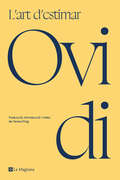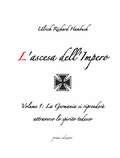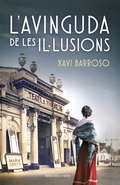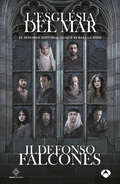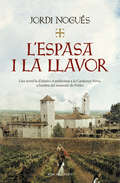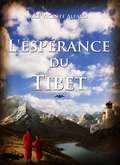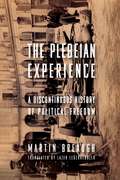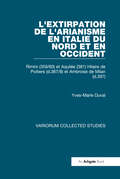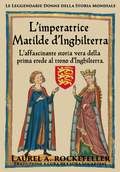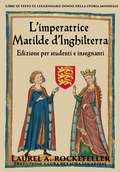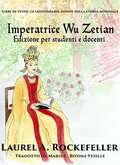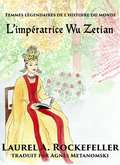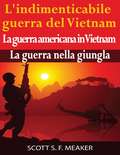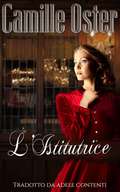- Table View
- List View
L'art d'estimar
by OvidiLa gran obra llatina de la poesia didàctica sobre l'amor, plena de saviesa, on Ovidi ensenya sobre l'amor sense oblidar la ironia, la paròdia i l'humor. Ovidi és el més gran exponent de la poesia didàctica llatina sobre l'amor i L'art d'estimar és la gran obra d'aquest gènere. Dividida en tres grans llibres, Ovidi dedica el primer i el segon als homes. Els explica on trobar dones, com seduir-les i mantenir el seuamor. El llibre tercer va dirigit a les dones, perquè s'enfrontin a la batalla «en igualtat de condicions». Ple de saviesa, Ovidi ensenya sobre l'amor sense oblidar la ironia, la paròdia i l'humor. «Si algú d'aquest poble no coneix l'art d'estimar, que llegeixi aquest poema i, instruït per la seva lectura, que estimi». Són els mots que encapçalen L'art d'estimar. Una lectura sensual i llicenciosa.
L'ascesa dell'Impero: Volume 1: La Germania si riprenderà attraverso lo spirito tedesco
by Ulrich Richard HambuchIl popolo dei poeti e dei pensatori, che sono stati per due volte vittime di terribili guerre mondiali nella storia recente, è di nuovo in una profonda crisi in questi giorni e si trova a un bivio. Negli ultimi sette anni, in questo contesto sono state prodotte innumerevoli, analiticamente brillanti, ma sobrie, lunghe e per la maggior parte incomprensibili e quindi in ultima analisi solo opere fugaci, in cui gli autori si sono sentiti chiamati a scoprire e denunciare le cose che ci hanno consapevolmente o inconsciamente oppresso negli ultimi decenni. In definitiva, però, tutti gli autori che conoscevo non sono riusciti a delineare un'alternativa olistica e sostenibile allo stato attuale. A questo bisognava porre rimedio. Oggi la considero una coincidenza del destino, che per alcuni anni non mi ha permesso da più parti di portare avanti la mia attività abituale in modo permanente e che mi ha portato, da ora in poi, a dedicarmi in solitudine e imparzialità al tema della ricerca della verità. Come persona che, dopo un po' di tempo di apprendimento, di pensiero, di sentimento e di pausa, è in grado di agire, non ho potuto trovare casa in nessun partito, in nessuna azienda o luogo della Repubblica Federale Tedesca. Così ho deciso senza ulteriori indugi di creare questa casa ideale politica, laica e spirituale per me stesso.
L'assistente del farmacista: (Storia di un destino venuto da lontano)
by Sandra SookooFascetta pubblicitaria Quando il destino chiama, puoi scappare o restare e combattere per ciò che hai sempre desiderato. In ogni caso, non avrai altra scelta che cambiare. La signora Ava Southerly, assistente farmacista e vedova, vive nella paura. È diventata un'esperta nel nascondersi per tenere le sue premonizioni sotto controllo. Nel 1885, cose come le streghe non esistono più, poco importa quali siano le sue origini. Se non mette in gioco il suo cuore, i suoi poteri soprannaturali resteranno latenti e le persone che ama non soffriranno, ma desidera ardentemente essere accettata e amata. Douglas Wallace, medico americano e discendente di un cacciatore di streghe scozzese, è a Londra per tenere una serie di conferenze sui progressi delle più moderne tecniche mediche. Quando incrocia di sfuggita lo sguardo di una bellissima giovane dai capelli biondi attraverso la vetrina di un ristorante, si sente irresistibilmente spinto a seguirla, come se le loro vite fossero legate a un livello ultraterreno. Pur credendo nella logica e nei fatti tangibili, il tempo in compagnia di Ava gli dimostra quanto si sbagli. Quando uno spirito ultracentenario si impossessa di Douglas per uccidere Ava, la bella strega e il dottore devono trovare un modo di sventare la minaccia venuta dell'oltretomba a rischio delle proprie vite. Mentre il loro rapporto evolve in qualcosa di profondo e duraturo, i due scopriranno la forza dell'amore.
L'audacia della seduzione: Collegati attraverso il tempo
by Dawn BrowerCome si comporta un uomo quando è attratto da una donna che non può avere? Bradford Kendall, il duca di Weston, si trova proprio in questa situazione difficile quando l’ex moglie di suo fratello si presenta alla sua tenuta. Regina aveva da sempre nutrito un forte sentimento nei confronti di Bradford e ciò si rivela particolarmente difficile da tenere a bada. Regina Dewitt intende scoprire cosa sia successo a sua sorella. Il miglior posto per iniziare la sua ricerca è proprio il luogo in cui era scomparsa: Weston Manor. Era passato ormai un anno, e gli indizi scarseggiavano, ma Regina è determinata. Non aveva messo in conto quanto potesse tentarla il duca che stabilmente abita nella tenuta. Iniziando la ricerca insieme, la domanda da porsi è sempre la stessa: saranno in grado di combattere il loro sempre più acceso desiderio?
L'avinguda de les il·lusions
by Xavi BarrosoDe minyona en una casa benestant a estrella del Paral·lel. La vida d'una dona que es va avançar al seu temps. Una novel·la emocionant i convulsa com l'època que retrata. Barcelona, 1909. Les germanes Romero arriben a la ciutat en plena Setmana Tràgica per servir a casa dels Puig. Els treballadors lluiten als carrers per unes condicions més dignes mentre la classe alta s'aferra als seus privilegis. La Francisca té un caràcter indomable i el cap ple de pardals, somia ser artista i una vida més lliure que la que la societat li ha destinat. Aviat coneixerà en Joan, un jove anarquista que li robarà el cor i li descobrirà la màgia del Paral·lel. La Francisca jugarà amb les seves lleialtats en una Barcelona revolucionària i en plena ebullició teatral. Coneixerà el costat més fosc de la ciutat, viurà la humiliació, la soledat, la traïció i un amor impossible que marcarà la seva vida. Però no renunciarà mai al seu somni. En una època on les dones ni tan sols tenien dret al vot, la Francisca serà sempre una dona lliure.
L'eredità e altri racconti.: Quattro novelle Recency
by Edith LaytonPrecedentemente pubblicate singolarmente, queste quattro novelle sono state raccolte per la prima volta in un libro. L'eredità: Valerian Blackwood viene convocato nella tenuta di campagna di suo zio per aiutare il vecchio a risolvere un problema con il suo erede. Ciò che Valerian trova è un mistero e l'amore della sua vita. Deve solo decidere cosa è più importante per lui: risolvere il mistero o conquistare la sua donna. Il tesoro nascosto: cosa deve pensare Hannah Jenkins dell'attraente uomo dagli occhi argentei che gli abitanti del villaggio portano a casa della sua famiglia dopo che è stato trovato ferito sulla riva vicino alla sua casa in riva al mare? Dice di essere stato vittima dei pirati. Ma chi è il pirata e chi è la preda? Qualcosa di blu: il giorno del matrimonio di June Heywood è offuscato da un'osservazione feroce che sente per caso e che la porta a chiedersi perché il bello e intelligente Lawrence, Lord Morrow, abbia chiesto la sua mano. A chi dovrebbe credere? Ai pettegolezzi o al suo cuore? Il matrimonio di due anime fedeli: La sorella della sposa e il fratello dello sposo, di temperamento simile, si scontrano per tutto il tempo senza rendersi conto di ciò che ai loro parenti è palesemente chiaro.
L'església del mar
by Ildefonso FalconesNova edició commemorativa del gran fenomen editorial: L'església del mar, d'Ildefonso Falcones, amb pròleg de l'autor. Una catedral construïda pel poble i per al poble a la Barcelona medieval és l'escenari d'una trepidant història d'intriga, violència i passió. Segle XIV. La ciutat de Barcelona és en un moment de màxima prosperitat, ha crescut cap a la Ribera, l'humil barri dels pescadors, i els seus habitants decideixen construir, amb els diners d'uns i l'esforç dels altres, el temple marià més gran conegut: Santa Maria de la Mar. Una construcció que és paral·lela a l'atzarosa història d'Arnau, un serf de la terra que fuig dels abusos d'un senyor feudal i es refugia a Barcelona, on es converteix en un ciutadà i, gràcies a això, en un home lliure. El jove Arnau treballa com a palafrener, bastaix, soldat i canvista. Una vida extenuant, sempre a l'empar de l'església de la mar, que el portarà de la misèria dels fugitius a la noblesa i la riquesa. Però amb aquesta posició privilegiada també arriba l'enveja d'altres ciutadans que ordeixen una sòrdida conjura que posa la seva vida en mans de la Inquisició... L'església del mar és una obra en la qual s'encreuen lleialtat i venjança, traïció i amor, guerra i pesta, en un món marcat per la intolerància religiosa, l'ambició material i la segregació social. Per tot això, aquesta no és només una novel·la excepcional, sinó també la més fascinant i ambiciosa recreació de la llum i les ombres de l'època feudal. Ressenyes:«Un relat que es llegeix amb la mateixa avidesa que s'ha escrit i que un voldria continuar tot i saber que s'ha acabat. Un retaule de meravelles.»José Enrique Ruiz-Domènec, La Vanguardia «L'església del mar despertarà passions entre lectors de tota mena, i amb justícia. Tant de bo tots els bestsellers fossin com aquest.»Care Santos, El Mundo «Una trama generosa en secrets i traïcions... Una notable història d'autosuperació.»Ricard Ruiz Garzón, El Periódico de Catalunya «Barcelona ja té el seu Els pilars de la Terra.»Qué Leer
L'espasa i la llavor
by Jordi NoguésAmb uns personatges històrics que cobren vida amb força i determinació, L'espasa i la llavor reconstrueix un moment clau de la història catalana quan -després de la victòria l'any 1149 de Ramon Berenguer IV contra Al-Muzaffar a Lleida- es repoblen les terres entre l'Ebre i el Llobregat, conegudes com la Catalunya Nova. L'any 1150 dotze monjos de l'abadia de Fontfreda creuen els Pirineus cap a la Catalunya Nova. Amb ells viatgen el pare Esteve, un jove amb un cor i una ment inquietes, i en Gilabert, un cavaller desenganyat de la cruel guerra on han perdut la vida els seus companys. La missió que tenen és fundar un monestir al lloc conegut com a Hortus Populetum, però l'arribada dels religiosos del Cister provocarà un conflicte sagnant amb en Ramon i en Ponç de Cervera, ja que veuen perillar el seu poder absolut a la regió. Durant l'edificació pedra a pedra dels murs de Poblet, les històries entrecreuades d'en Gilabert, l'Esteve i la Gaia «la jove i ambiciosa filla del senyor de l'Espluga», embolicats en conspiracions i assassinats, submergeixen el lector en una època convulsa i fascinant. L'espasa i la llavor és una novel·la on es conjuguen el rigor històric i la voluntat de dotar els seus protagonistes d'uns ideals i d'unes ambicions que els fan molt humans.
L'espérance du Tibet
by Jose Vicente Alfaro Didier DetuneLe Tibet au XIIIème siècle. Le pays appelé "Pays des neiges", flambeau du bouddhisme en Orient, se trouve sous l'autorité de l'Empire mongol dont les dominations s'étendent sur la plus grande partie connue de la planète. Dans un tel contexte, le décès du leader de la principale école bouddhiste du pays oblige ses fidèles à se lancer en quête de sa réincarnation : un enfant qui méconnaît encore la sagesse qu'il renferme en lui et le rôle que le destin lui a réservé quant au devenir de son peuple. Entre-temps, une humble famille d'origine paysanne, harcelée par les agressions de l'armée mongole, abandonne son village natal et se voit obligée d'entreprendre un voyage aux conséquences imprévisibles pour chacun de ses membres. Un roman palpitant et émouvant qui plonge le lecteur dans un environnement de légende où la ferveur des gens et la rudesse du paysage s'harmonisent pour ne faire qu'un.
L'estate di smeraldo
by Olga KryuchkovaRussia. Fine del XIX secolo. Ėl'za Riger, figlia illegittima del possidente Selivanov, viene a sapere della morte di suo padre e che le spetta una non piccola eredità. Ricolma di speranze per il futuro, si dirige verso la tenuta del padre con il proprio fidanzato. Nella tenuta Ėl'za viene a sapere che, sfortunatamente, non è l'unica erede e il contenuto del testamento fa cadere la ragazza in stato di shock. Secondo il testamento, l'eredità toccherà all'erede che la troverà per primo. Tra gli eredi si svolge un'aspra lotta per il possesso della ricchezza di Selivanov. Per ottenere l'eredità gli eredi non disdegnano alcun mezzo. Per giunta nel possedimento appare un certo fantasma… La sorella del defunto Selivanov, che è una medium, tiene una seduta spiritica, avendo intenzione di richiamare lo spirito del fratello defunto e venire a sapere: dove ha nascosto i suoi enormi tesori? Per giunta Ėl'za trova casualmente in biblioteca il manoscritto di un certo conte Savin, in cui si descrivono le sue tumultuose avventure in Sudamerica. Presto la ragazza comincia a sospettare che Savin sia suo padre…
L'estrella de l'Illa Nord
by Sarah LarkLa novel·la de la sarah Lark més autèntica:Una història fascinant d'amor i de traïció, de desesperació i de coragte ambientada a Noava Zelanda. Hannover, 1910. La flama que pren entre la filla del banquer jueu Mia i el jove oficial Julius és amor a primera vista. Per emprendre un futur junts, emigren a Nova Zelanda, on volen muntar un negoci de cria de cavalls. Tot i això, quan esclata la Primera Guerra Mundial, les sospites d'espionatge recauran sobre la parella i hauran de viure la guerra separats en camps d'internament, sense saber si l'altre és viu o mort, però amb l'esperança de tornar-se a trobar. El que no saben és que després de la guerra res no tornarà a ser com abans.
L'experience plebeienne
by Martin BreaughHow do people excluded from political life achieve political agency? Through a series of historical events that have been mostly overlooked by political theorists, Martin Breaugh identifies fleeting yet decisive instances of emancipation in which people took it upon themselves to become political subjects. Emerging during the Roman plebs's first secession in 494 BCE, the plebeian experience consists of an underground or unexplored configuration of political strategies to obtain political freedom. The people reject domination through political praxis and concerted action, therefore establishing an alternative form of power. Breaugh's study concludes in the nineteenth century and integrates ideas from sociology, philosophy, history, and political science. Organized around diverse case studies, his work undertakes exercises in political theory to show how concepts provide a different understanding of the meaning of historical events and our political present. The Plebeian Experience describes a recurring phenomenon that clarifies struggles for emancipation throughout history, expanding research into the political agency of the many and shedding light on the richness of radical democratic struggles from ancient Rome to Occupy Wall Street and beyond.
L'extirpation de l'Arianisme en Italie du Nord et en Occident: Rimini (359/60) et Aquilée (381) Hilaire de Poitiers (d.367/8) et Ambroise de Milan (d.397) (Variorum Collected Studies)
by Yves-Marie DuvalThe context of this second volume by Professor Duval is the trinitarian controversies of the later 4th century. His work presents a detailed analysis of the 'reconquest' of Northan Italy and Illyricum from the homeist dogmas put in place by Constans II and affirmed by the Council of Rimini in 359-60. Milan occupies a central place, first as a bastion of Arianism, then as the see of Ambrose, who eventually oversaw the victory of orthodoxy; as these studies show, the process was not straightforward, and even after the Council of Aquileia in 381, remained imperilled by the turbulent politics of the Empire. The final item, hitherto unpublished, gives a critical account of some recent work on Ambrose.
L'histoire de Nala
by Letty Stevens Mark GardnerNala et sa sœur sont deux esclaves vivant sous la dynastie de Han. Une rencontre fortuite au bazar conduira Nala à accepter une mission permettant à sa sœur d’être à l’abri du mal. Elle apprendra ainsi qu’il ne faut pas se fier aux apparences. Pourra-t-elle se sauver et sauver sa sœur avant qu’il ne soit trop tard ?
L'homme aux deux noms: Roman de la Rome Antique
by Vincent B. Davis IIPour préserver son village, un homme pacifique doit survivre dans la sanglante ville de Rome. «Les forces narratives de Davis résident dans la description des horribles réalités de la guerre et dans sa manière de donner vie au contexte historique… » -Publishers Weekly Rome, 107 av. Quintus Sertorius vient de perdre son père et risque de perdre son foyer. Lorsque son village rural est dépouillé de son statut politique, il doit quitter sa famille pour assurer leur subsistance et leur protection à l'intérieur du gouvernement sanguinaire de Rome. Alors qu'il passe du statut de paysan à celui de politicien, il se retrouve au cœur d'une guerre politique acharnée... Tandis que Quintus s'efforce d'obtenir l'aide dont son village a désespérément besoin, il se rapproche de Gaius Marius, l'oncle de Jules César lui-même. Mais chaque jour qui passe dans le paysage impitoyable de la Ville éternelle met sa famille et sa propre vie en danger. Dans un impitoyable combat de conscience, Quintus risque de tout perdre: ses proches et sa raison. L'homme aux deux noms est le premier livre de la série de fiction historique Sertorius Scrolls. Si vous aimez les ambitions héroïques, les cadres historiques bien documentés et la corruption romaine, vous aimerez le récit puissant de Vincent B. Davis II. Achetez L'homme aux deux noms pour vous plonger dans le monde ténébreux de Rome dès aujourd'hui !
L'héritage de la mer du Nord
by Camille OsterHériter d'une belle demeure est une bénédiction, même lorsqu’elle se situe le long de la côte sauvage et indisciplinée de la mer du Nord. Avec son frère, Vivienne Harcourt se joint à leur ami Archibald pour prendre possession de sa propriété balayée par le vent, à ce qu’il leur semble être l’autre bout du monde. Le mystérieux et introverti Lord Routledge, dont la présence détachée rend Vivienne à la fois incertaine et curieuse, fait également partie des convives. Sous le regard attentif du portrait de l'ancienne propriétaire, la sévère Mlle Trubright, l'isolement de la maison met les nerfs à rude épreuve, teste les amitiés et laisse apparaitre la vraie nature de chacun.
L'imperatrice Matilde d'Inghilterra
by Laurel A. RockefellerLa ruggente leonessa d’Inghilterra! Con la sua discendenza reale normanna, sassone e scozzese Matilde, nata nel 1102 da re Enrico d’Inghilterra e dalla regina Matilde di Scozia, era destinata a unificare un’Inghilterra ancora divisa dalla conquista di suo nonno, avvenuta nel 1066. Quando il naufragio della Nave Bianca nel 1120 la rese l’unica figlia vivente dei suoi genitori, Matilde divenne improvvisamente erede del trono inglese in un era in cui la successione era ancora decisa dai witan sassoni anziché dalla volontà del sovrano. Scoprite la storia della prima donna che ha rivendicato il trono Inglese! Include l’albero genealogico di Matilde, una cronologia dettagliata e letture consigliate per approfondire gli studi.
L'imperatrice Matilde d'Inghilterra: Edizione per studenti e insegnanti (Libri di testo Le leggendarie donne della storia mondiale #7)
by Laurel A. RockefellerLa ruggente leonessa d’Inghilterra! Con la sua discendenza reale normanna, sassone e scozzese Matilde, nata nel 1102 da re Enrico d’Inghilterra e dalla regina Edith Matilde di Scozia, era destinata a unificare un’Inghilterra ancora divisa dalla conquista di suo nonno, avvenuta nel 1066. Quando il naufragio della Nave Bianca nel 1120 la rese l’unica figlia vivente dei suoi genitori, Matilde divenne improvvisamente erede del trono inglese in un'era in cui la successione era ancora decisa dai witan sassoni anziché dalla volontà del sovrano. Scoprite la storia della prima donna che ha rivendicato il trono Inglese! L’edizione per studenti e insegnanti include domande alla fine di ogni capitolo, così come una cronologia dettagliata e letture consigliate.
L'imperatrice Wu Zetian: Versione per studenti e docenti (Libri di testo: Le leggendarie donne della storia mondiale #5)
by Laurel A. RockefellerLa donna piu' odiata della storia cinese! Nata nel 624 d. C., nella contea del Wenshui, provincia di Shanxi, nessuno si aspettava un futuro brillante per la bella Wu Zhao (il cui titolo regale era Wu Zetian) -- a parte causare danno allo sventurato che l'avrebbe sposata. L'esatto contrario di quanto ci si aspetta da una donna negli insegnamenti del confucianesimo, Wu Zhao non era solamente brillante, ma anche ben istruita e sproporzionatamente ambiziosa. Giudicata duramente, sia dai contemporanei che dai posteri in Cina, l'imperatrice Wu, di sicuro, mette tutti d'accordo sul fatto che il mondo, oggi, sia un posto migliore grazie alla sua audacia nello sfidare le convenzioni dell'epoca, osando fare cio' che nessun'altra donna dell'epoca avrebbe mai nemmeno sognato. Questo libro racconta la vera storia di una tra le donne piu' leggendarie al mondo. L'edizione per studenti e docenti comprende domande alla fine di ogni capitolo, volte a stimolare la riflessione critica su svariati temi, inoltre, alla fine della storia, viene fornita un'esaustiva cronologia ed una dettagliata lista di letture consigliate.
L'impératrice Wu Zetian
by Laurel A. Rockefeller Agnès MetanomskiLa femme la plus haïe de l'histoire de la Chine ! Voyagez plus de mille ans en arrière dans le temps et rencontrez la première et unique femme empereur de la Chine. Née Wu Zhao et attribuée le titre de règne « Zetian » quelques semaines seulement avant sa mort en 705 CE, elle était la fille indésirable du chancelier Wu Shihuo -- trop intelligente, trop éduquée et trop intéressée par la politique pour être une bonne épouse, selon les interprétations contemporaines des Entretiens de Confucius. Est-il surprenant que jusqu'à ce jour elle demeure la femme la plus haïe de toute l'histoire de la Chine et une de ses plus controversées ? Explorez la vie de l'impératrice Wu et découvrez pourquoi le monde est un endroit bien plus différent parce qu'elle a osé faire ce qu'aucune femme en Chine, avant et depuis, n'a jamais rêvé de faire.
L'incanto di Lady Elianna
by Amanda Mariel Sara MinerviniAlla morte del padre, Lady Elianna, figlia del sesto Conte di Berkly resta sola e priva di sostanze. I cugini che hanno ereditato titolo e proprietà la pongono di fronte a una scelta impossibile: entrare in convento o rimanere al servizio della famiglia. Degradata dal suo rango, Elianna accetta di fermarsi a Crystal Court, l’unico posto che abbia mai considerato come casa, nonostante le continue vessazioni subite da parte della nuova Lady Berkly e dalla sua viziata e frivola figlia, Lady Caroline. Proprio il ballo in onore di Lady Caroline per il suo debutto in società e l’incontro con l’affascinante visconte Garrett Sinclair offriranno a Elianna un motivo per «osare sognare» di nuovo. Una Cenerentola in chiave romance, una fiabesca storia d’amore che incanterà i lettori. Tornano in questo terzo libro della serie Amori da Favola alcuni dei personaggi più amati dalle lettrici italiane di Amanda Mariel, come Rose e Hunter, ora marito e moglie e Conti di Aubry, gli indimenticabili protagonisti di Stregata dal Conte, primo libro della serie.
L'indimenticabile guerra del Vietnam: La guerra americana in Vietnam – La guerra nella giungla
by Scott S. F. Meaker Cinzia PasqualinoIl numero di battaglie per il potere che fanno parte del tessuto del Vietnam è alquanto evidente. Le battaglie erano brevi, intense e combattute nelle giungle e nelle risaie. Gran parte della guerra implicava degli attacchi di guerriglia.
L'inviata
by Geraldine Solon Elisa FratiLa giornalista americana Sophie Matthews è alla ricerca di quel posto, tanto difficile da trovare, che possa chiamare casa. Lavorare alla Constar Communications da una parte le ha permesso di vedere il mondo e di conoscere culture diverse, ma dall'altra la vita da nomade le ha impedito di avere relazioni durature. Ora che sta per compiere quarant'anni, le priorità di Sophie cambiano e decide di lasciare il lavoro per inseguire un sogno diverso: conoscere un uomo, sistemarsi e metter su famiglia. Il suo capo, Greg Sullivan, ha una sola richiesta: Sophie deve prima portare a termine un ultimo incarico sulla vita dell'artista e scrittrice Marina Suárez. Durante la seconda guerra mondiale, tutti gli abitanti del villaggio di Marina furono catturati dai soldati giapponesi e lei è stata l'unica a sopravvivere. Come sia riuscita a scampare al massacro rimane un mistero. L'incarico suscita la curiosità di Sophie, ma è riluttante al pensiero di tornare alle Filippine, luogo dal quale, dieci anni prima, se n'era andata con il cuore spezzato per via di Eric Santiago, l'unico uomo che Sophie abbia mai amato. Destino vuole che, poco dopo il suo ritorno a Manila, le loro strade si incrocino di nuovo. Mentre Sophie cerca di svelare il mistero della vita Marina, scopre che Eric è l'unico a poterla aiutare a mettere insieme i pezzi. Quello che non sa è che l'oscuro segreto di Marina le cambierà la vita per sempre.
L'isola di vetro
by Kathryn Le VequeUna donna ribelle e un valoroso cavaliere; riusciranno a trovare l’amore? 1333 – La bella e istruita Lady Aubrielle de Witney è considerata da tutti una ragazza ingestibile. Poiché sua madre non è più in grado di controllarla, l’ha affidata allo zio, il Conte di Wrexham. Come un codardo, il Conte delega i suoi doveri al suo più fidato cavaliere, Sir Kennet St. Héver, con l’istruzione di metterla in riga. Aubrielle e Kenneth sono fin da subito ai ferri corti; Kenneth si aspetta obbedienza e Aubrielle è tutto fuorché compiacente. Placate le ostilità iniziali e creatasi fra i due una certa, strana complicità, Kenneth scopre che Aubrielle nasconde un segreto. Per ragioni diverse, una setta misteriosa e un cavaliere impazzito vogliono morta la Lady. Kenneth si ritroverà a proteggerla non perché gli è stato ordinato, ma perché lo vuole con tutto sé stesso.
L'istitutrice
by Camille OsterPrima di ricevere la risposta alla sua richiesta per una posizione di istitutrice, mai Estelle Winstone aveva immaginato di dover lasciare l'Inghilterra. La sola idea di dover viaggiare fino in Ungheria le provoca una forte tensione allo stomaco, come anche il fatto di dover incontrare il misterioso conte che diventerà il suo datore di lavoro. Sola e senza capire una parola di ungherese, raggiunge la sua nuova casa, un tetro castello nascosto tra montagne abitate da lupi affamati. Un castello perseguitato da una lunga storia e da tragedie recenti.
